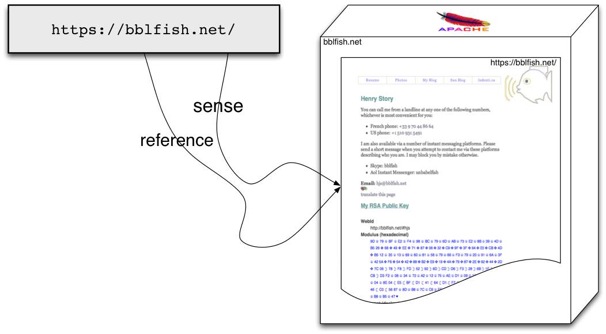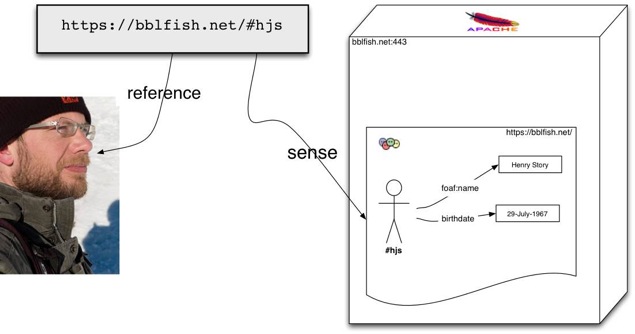- From: Henry Story <henry.story@bblfish.net>
- Date: Thu, 12 Jan 2012 02:06:40 +0100
- To: Kingsley Idehen <kidehen@openlinksw.com>
- Cc: public-xg-webid@w3.org
- Message-Id: <B30FBFD5-7068-4F6D-8583-5FB2DC46AFC7@bblfish.net>
Please spend some time READING THIS CAREFULLY.
Wait until tomorrow before answering. Think over it tonight.
There is a lot in here, it is easy, but it would be a pitty if because of attempting to read it too quickly the point ended up being lost.
On 12 Jan 2012, at 00:27, Kingsley Idehen wrote:
> On 1/11/12 6:07 PM, Henry Story wrote:
>>
>> On 11 Jan 2012, at 20:56, Kingsley Idehen wrote:
>>
>>> On 1/11/12 2:45 PM, Henry Story wrote:
>>>> That depends on what your definition of the Web is. Tim Berners Lee's definition was "a mapping from URIs onto meaning"
>>>> http://blogs.oracle.com/bblfish/entry/possible_worlds_and_the_web
>>>>
>>>>> > > The end destination is inevitable. WebID or NetID, note, I've seen this movie before.
>>>>> > > I say "Check!" so your move next:-)
>>>> Well if the game is a good spec, then my answer is above. (but perhaps let's not get sidetracked in the meaning of the web, part).
>>
>>> If you want to hone into definitions, then start with URIs.
>>>
>>> URI abstraction enables one associate URIs with Descriptor Resources for their Referents.
>>
>> That is not a very clear definition of URIs but I understand what you mean.
>>
>> There are many ways you can put this. URIs are names for things.
>
> Yes.
>
>> ( Sometimes those things are documents, sometimes not. )
Notice how I speak of things here, not names.
>
> There lies the problem.
Which problem? This is by definition how URIs work.
>
> Sometimes they are Names and sometimes they are Addresses.
I was speaking about the object, and you have come back round to speak about the name. That is what is confusing you.
BBLFISH: "The object to which the name refers is sometimes a document sometimes not."
KINGSLEY: "The name is sometimes a name sometimes and address"
We are not speaking of the same thing. The subject of those two sentences is different. In my case the subject is the "object", in your case the subject is the name.
So you shift to the URI, and speak about how it is sometimes a Name and sometimes an address - i.e.: you are splicing the URIs up into URLs and URNs. Where I was talking about the World you are talking about the Word. (notice already how close those two words are:
WORLD
WORD
There is just one L missing between them. The L for Language? Words are about objects in the World. (english is a funny language like that)
At the level of syntax, of language, of tokenised strings, which is where URIs exist, they are all identifiers. "URI" after all is an abbreviation for "Universal Resource Identifiers". Historically there was a confusion before the URI spec came out between locators and names, which led to endless conversations such as this one. So the URI spec was developed to overcome that, which is good.
URIs then REFER to things such as documents or things that are not documents. That is the role of URIs to identify things. Those things are (in most cases) not themselves URIs.
So let us add a couple of illustrations to help out.
In the grey box below we have put the URI which is the name for a document served by an apache server. The name is one thing (it has 21 characters) the document is another thing (it contains a public key and many more characters, and can change over time)
When, as in this case, the URI _refers_ to a document, the sense and the reference of the URI coincide: they are both the document, or information resource referred to.
But with "https://bblfish.net/#hjs" things are different. That URI refers to <https://bblfish.net/#hjs> ie to me. The sense of the URI can be found at <https://bblfish.net/> which is a document, the same document we were discussing in the previous diagram.
Still notice that there is no ambiguity.
"http://bblfish.net/" refersTo the document.
"http://bblfish.net/#hjs" refersTo [ foaf:name "Henry Story" ] .
"http://bblfish.net/" sense <http://bblfish.net> .
"http://bblfish.net/#hjs" sense [ #hjs asgivenby <http://bblfish.net> ] .
Good so your classification of URIs into names or locators is one that is very prone to lead you and your customers to confusion if you are not very careful, and this for a number of reasons:
"https://bblfish.net/#hjs" is a URI, but is it in your terminology a Name or an Address? Does it matter? It refers to me and I do have an address - I live in France. Ah but then you will say that is not the address you mean: you mean an internet address like "https://google.com/" right? (Ok, but you see how you will already have confused some of your clients here who intuitively will think of "address" to mean the place in physical space) So by address you mean location in the Web Information space. (which is not a space, because everything is one click away - it would be as if every object in physical space were just one step way - true in black holes perhaps but not elsewhere usually).
But then you get into a second dilemma, because you say ahha "https://bblfish.net/" could also not be an address. It could be a referent to Henry if there is a 303 redirect!! Well this just shows that your address/name distinction is not a syntactic one, but a concept that shifts between syntax and semantics. But the reason syntax and semantics are kept stricly separate is to avoid those types of issues, which lead to the confusions that keep dogging us. And I know you have a lot better work to do than keep having everybody you talk to fall into these confusions, and so do most people in the semantic web. These are really quite easy to understand, but you have to be firm in maintaining them. It is a bit like slavery: one just has to say no, this is a bad concept, it creates confusion between human beings and property, and so we should not maintain that distinction. Simple shifts like that make for revolutions.
Hope this helps,
Henry
So to follow one perhaps we can move to the question you asked in this e-mail http://lists.w3.org/Archives/Public/public-xg-webid/2012Jan/0515.html
[[
What's wrong with the following in SAN?
URI=
http://id.myopenlink.net/dataspace/person/KingsleyUyiIdehen
RFC822
Name=kidehen@openlinksw.com
]]
I answered that here:
http://lists.w3.org/Archives/Public/public-xg-webid/2012Jan/0532.html
Given what I have said here, perhaps we can revisit my answer in that e-mail now?
Henry
Attachments
- text/html attachment: stored
- image/jpg attachment: Sense-and-Reference-Web1.jpeg

- image/jpg attachment: Sense-and-Reference.jpeg

Received on Thursday, 12 January 2012 01:07:12 UTC